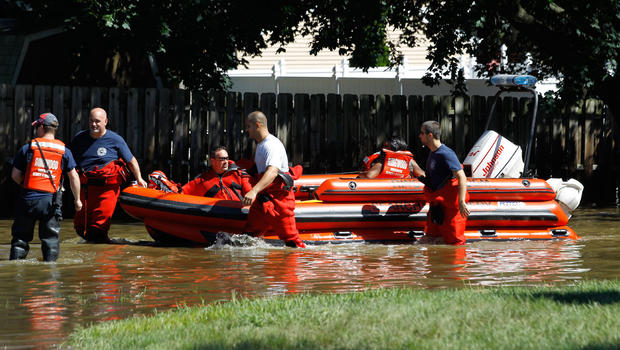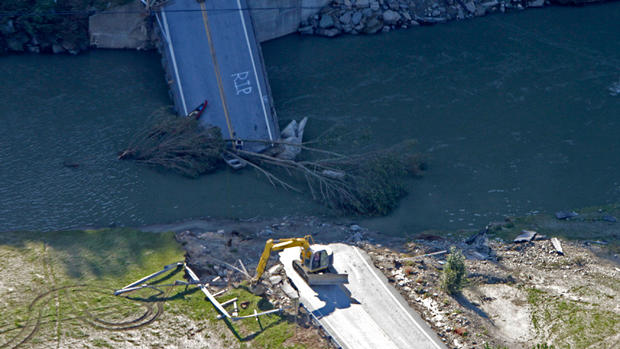Hurricane Irene relief funding sets up budget fight
Michele Bachmann may have been joking when she called Hurricane Irene a sign from God to cut spending, but Republican leaders in Congress are serious about keeping spending in check, in spite of the hurricane and other costly disasters.
Federal Emergency Management Agency Director Craig Fugate has declined to predict how much recovery efforts from Hurricane Irene will cost, but with widespread damage along the East Coast, it could run well into the billions. House Majority Leader Eric Cantor said Monday that whatever bills the federal government racks up paying for the recovery efforts will have to be offset with spending cuts elsewhere.
"This is a time, an appropriate instance, where there is a federal government role," Cantor said on Fox News. "We will find the money if there is a need for additional monies. But those monies are not unlimited, and what we've always said is we offset that which has already been funded."
Last week, after a 5.8-magnitude earthquake hit his Virginia district, Cantor also said emergency relief funding had to be offset with cuts.
Damage from the earthquake was estimated to run in the tens of millions of dollars, at the least. The hurricane damage could be much worse. On NBC's "Meet the Press" on Sunday, New Jersey Gov. Chris Christie said the hurricane would cost in "the billions of dollars" in his state alone.
FEMA currently has over $900 million in its federal disaster fund, but the agency is still funding response and relief efforts in other disaster areas.
The federal government, Cantor said today, should operate "just like any family would operate when it's struck with disaster -- It finds the money it needs to take care of a sick loved one, or what have you, and then goes without trying to buy a new car or trying to put a new addition onto the house."
For FEMA, prioritizing hurricane relief spending means temporarily suspending some payments to help the Southern states impacted by the devastating tornadoes that struck in the spring, including the tornado that killed hundreds in Joplin, Missouri, the Washington Post reports.
While Cantor may insist on offsetting disaster relief expenses, that policy could be a hard sell to other Republicans who represent areas in need of assistance. Republican Sen. Roy Blunt of Missouri released a statement today decrying the reallocation of FEMA funding from tornado assistance to hurricane assistance.
"The federal government has committed resources to help Missouri communities recover from crippling flood and tornado damage, and I expect that commitment to be fulfilled expeditiously," he said. "If FEMA can't fulfill its promise to our state because we have other disasters, that's unacceptable, and we need to take a serious look at how our disaster response policies are funded and implemented."
On Fox this morning, Cantor pointed out that the House has passed a Homeland Security Department appropriations bill that includes $1 billion in additional money for the FEMA disaster fund this year and more than $2 billion for 2012.
In May the Obama administration released a statement saying it supported the House funding bill, but it opposed language that would direct the president to submit a budget amendment with offsets when FEMA's disaster fund dips below a certain threshold.
It also criticized the measure for "insufficient funding for a number of programs." For instance, the administration said the bill insufficiently funded FEMA's state and local safety grants, reducing the number of firefighters funded by the program by about 2,200.
While it's unclear how the administration will work with Congress to fund additional emergency relief needs, Mr. Obama said today, "We're going to make sure folks have all the support they need as they begin to assess and repair the damage left by the storm."
In a separate statement, the president noted the sixth anniversary of Hurricane Katrina, which devastated New Orleans.
"Today is a reminder of not just the immediate devastation that can be caused by these storms, but the long term needs of communities impacted by disasters - whether in Mississippi or Alabama, Tennessee or Missouri, North Dakota, or the east coast states impacted by Hurricane Irene," Mr. Obama said. "This administration will stand by those communities until the work is done."

